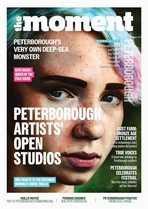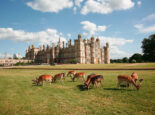The Recruiting Officer
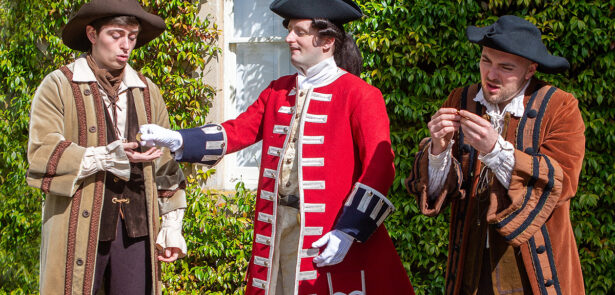
The creative team at Tolethorpe Hall look set to deliver another summer of knock-out theatre this year with a range of plays at their spectacular outdoor venue, including A Midsummer Night’s Dream, Sense and Sensibility and A Monster Calls. Completing the set is George Farquhar’s The Recruiting Officer, a rollicking, riotous Restoration comedy written and set in the early 1700s. We spoke to Ken Walsh, the play’s director, to find out more...
First of all, what was it about The Recruiting Officer that made you want to choose it?
I like it because it’s not set in the big city like so many other Restoration comedies; it’s set in the market town of Shrewsbury, and it just gives a very real picture of people’s ordinary lives in a time of strange events and how they affect them – war, money and romance. It has lots of themes that are relevant today, like the place of women and how they overcome the second-rate place they’ve been allotted by society. It’s also got a great story, it’s riotously funny, and it fits so well in an open-air theatre – there’s a sort of magic to it, although originally it was performed at the Drury Lane Theatre in London (and incidentally, it became the most popular play of the 18th century). The setting is a town market place, and the fields and riverside around that town – we’re creating those on set with a beautiful design of buildings that look as though they’re straight out of Shrewsbury marketplace itself, with the town hall in the background. We’ve got some mobile market stalls full of 18th-century market goods like flowers, fruit, bread – all that sort of thing. It also has some wonderful roles for the cast to enjoy.
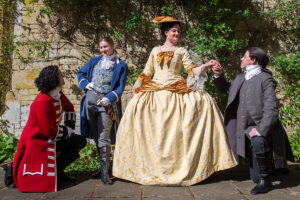 How have you and the creative team approached bringing the text to life?
How have you and the creative team approached bringing the text to life?
Our Shrewsbury is not a carbon copy, more it gives a general impression of the marketplace. On one side, there are two levels with an apartment that you can see into, and on the other side there is a household that you can see into, but it’s all open. The set is also designed to be very flexible because there is a lot of action and many actors on stage, so people need to move around.
Amanda Roberts, a set designer and a photo shoot operator, is helping us with the decoration of the set, such as the mobile stalls, and we’re really fortunate to have her working with us. There’s also a lot of magic in the play – in one scene the recruiting officer, who is recruiting men to go to war, fools them by disguising himself as a fortune teller. Amanda has designed an amazing fortune teller’s tent, and I’ve also been consulting with a magician about some stage magic the ‘fortune teller’ can perform. It adds a wonderful element to the play.
Another aspect of the design is the costumes – we are presenting authentic, early 18th-century costumes. So, while the overall representation may not be completely realistic, the costumes are absolutely authentic and specially made by our costume designer, Miriam Spring Davies. She and her team have worked hard to ensure that the costumes are historically accurate, and we’ve even brought in specially-designed military costumes for the army – they are absolutely spot-on for the year 1706.
Comedy is notoriously tricky to get right, even more so a comedy from centuries ago that might need certain tweaks or interpretation to get jokes across to a contemporary audience. How have you tackled that?
I’m quite experienced in directing comedy! The last big comedy I directed was ‘The Merry Wives of Windsor’, which we set in the 1940s. A key aspect, that I’m keen on, is fast pacing – I love that sort of thing. We have a lovely cast of experienced actors, as well as new actors who have just trained in the field, and we get to utilise the best abilities that these individuals have. For example, one of our actors is currently training in stunt work, Thomas Dorman, who’s playing the lead, Captain Plume – he is actually professionally engaged in filming and stunt work. We also have Kevin Burke on the team as the fight director, who has worked at Tolethorpe for many years. There are so many wonderful, fast-paced elements in the production, and luckily the text has always been very accessible; it has a direct connection to the audience, there is no fourth wall – we break that all the time, constantly playing to the audience right from the start.
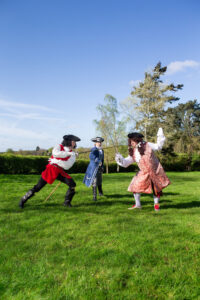 And you’ve got musicians on-stage as well, to really liven up the action!
And you’ve got musicians on-stage as well, to really liven up the action!
I’ve involved some very talented folk musicians that I know, John Such and Bridget Skanksi-Such, and they’re also folk music experts. John in particular has researched the music and found the original from the text, which would have been played at the time. So we have wonderful, authentic music, we play it live on stage, and also invite the audience to join in!
What’s your favourite aspect of the performance season?
When you can tell that the audience knows, right from the beginning, that they’re involved and they can laugh – I love it! There are some great moments where the audience cannot help but applaud, and when that happens for the first time it’s incredible. Every evening the audience is different, so you can’t expect the play to always feel the same – that’s the great thing about a four-week run. In amateur theatre, all the time you usually have is a week, or sometimes even less, but what I look forward to is that development, that evolution over the run, and the different responses from the audience as the play goes on.
- To book tickets for The Recruiting Officer or any of the other plays at Tolethorpe Hall this season, visit tolethorpe.co.uk


